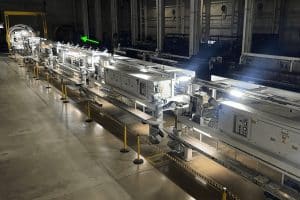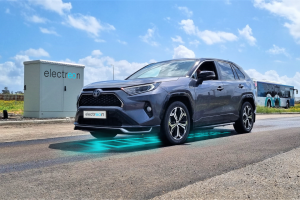- 🔧 Porsche is recalling 749 Taycan all-electric vehicles from 2021 to 2024 due to a high-voltage battery short-circuiting risk.
- ⚡ The recall affects Taycan, Taycan 4S, and Taycan 4 Cross Turismo models.
- 🔥 Short-circuiting in the high-voltage battery can lead to thermal events and fires.
- 🏭 Production issues in the high-voltage battery modules are identified as the root cause of the problem.
- 🔄 Porsche sources its batteries from LG Energy Solutions in Poland.
- 📅 Taycan units produced after March 4, 2024, are not subject to the recall.
- 🔌 Porsche advises affected vehicles to be charged only up to 80 percent.
- 🛠️ Replacement battery modules will be produced using improved cell production quality.
- 🇨🇳 Last year, Porsche recalled 2,570 Taycan units in China due to battery issues.
In a move that underscores the importance of safety in electric vehicles (EVs), Porsche has announced a recall affecting hundreds of Taycan all-electric vehicles. This recall, prompted by concerns over high-voltage battery short-circuiting risks, sheds light on the intricate balance between innovation and safety in the automotive industry.
The Recall: Addressing Potential Risks
Porsche is recalling 749 Taycan units spanning the years 2021 to 2024, a proactive measure aimed at mitigating the risk of high-voltage battery short circuits. The affected models include the Taycan, Taycan 4S, and Taycan 4 Cross Turismo, emphasizing the breadth of the issue across various configurations.
Understanding the Risks: Thermal Events and Fires
The primary concern with high-voltage battery short circuits is the potential for thermal events and fires. These incidents pose significant safety hazards, both to vehicle occupants and surrounding infrastructure. By addressing the root cause of the problem, Porsche aims to safeguard against such risks and uphold its commitment to customer safety.
Identifying the Root Cause: Production Issues
Production issues within the high-voltage battery modules have been identified as the underlying cause of the short-circuiting risk. This revelation underscores the complexities involved in manufacturing advanced battery systems, highlighting the need for stringent quality control measures throughout the production process.
Supply Chain Dynamics: The Role of Battery Suppliers
Porsche’s reliance on battery suppliers, such as LG Energy Solutions in Poland, underscores the interconnected nature of the automotive supply chain. While outsourcing battery production can offer efficiency and expertise, it also introduces dependencies that must be carefully managed to ensure product quality and safety standards are upheld.
Implementation of Solutions: Ensuring Effectiveness
Porsche’s decision to recall affected vehicles is just one aspect of its commitment to addressing the issue. By advising owners to limit charging to 80 percent and implementing improved cell production quality for replacement battery modules, the company demonstrates a proactive approach to remedying the situation and preventing future incidents.
Lessons Learned from Past Recalls: A Global Perspective
Porsche’s recall of 2,570 Taycan units in China last year due to battery issues serves as a poignant reminder of the global nature of automotive safety challenges. As EV adoption continues to grow worldwide, automakers must remain vigilant in identifying and addressing potential risks to ensure the safety and confidence of consumers.
Conclusion: Balancing Innovation and Safety
The Taycan recall underscores the inherent challenges in developing cutting-edge electric vehicles while maintaining rigorous safety standards. By proactively addressing issues and implementing robust solutions, Porsche reaffirms its commitment to prioritizing customer safety in the pursuit of automotive innovation.





